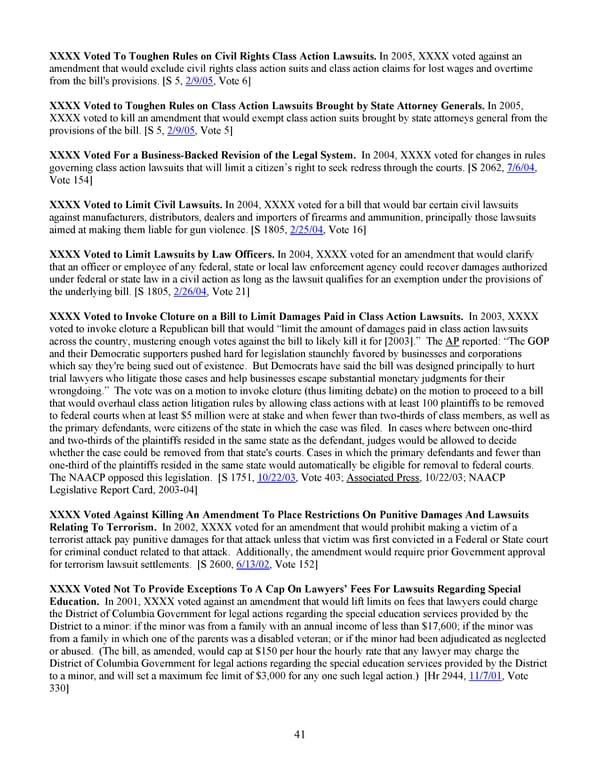XXXX Voted To Toughen Rules on Civil Rights Class Action Lawsuits. In 2005, XXXX voted against an amendment that would exclude civil rights class action suits and class action claims for lost wages and overtime from the bill's provisions. [S 5, 2/9/05, Vote 6] XXXX Voted to Toughen Rules on Class Action Lawsuits Brought by State Attorney Generals. In 2005, XXXX voted to kill an amendment that would exempt class action suits brought by state attorneys general from the provisions of the bill. [S 5, 2/9/05, Vote 5] XXXX Voted For a Business-Backed Revision of the Legal System. In 2004, XXXX voted for changes in rules governing class action lawsuits that will limit a citizen’s right to seek redress through the courts. [S 2062, 7/6/04, Vote 154] XXXX Voted to Limit Civil Lawsuits. In 2004, XXXX voted for a bill that would bar certain civil lawsuits against manufacturers, distributors, dealers and importers of firearms and ammunition, principally those lawsuits aimed at making them liable for gun violence. [S 1805, 2/25/04, Vote 16] XXXX Voted to Limit Lawsuits by Law Officers. In 2004, XXXX voted for an amendment that would clarify that an officer or employee of any federal, state or local law enforcement agency could recover damages authorized under federal or state law in a civil action as long as the lawsuit qualifies for an exemption under the provisions of the underlying bill. [S 1805, 2/26/04, Vote 21] XXXX Voted to Invoke Cloture on a Bill to Limit Damages Paid in Class Action Lawsuits. In 2003, XXXX voted to invoke cloture a Republican bill that would “limit the amount of damages paid in class action lawsuits across the country, mustering enough votes against the bill to likely kill it for [2003].” The AP reported: “The GOP and their Democratic supporters pushed hard for legislation staunchly favored by businesses and corporations which say they're being sued out of existence. But Democrats have said the bill was designed principally to hurt trial lawyers who litigate those cases and help businesses escape substantial monetary judgments for their wrongdoing.” The vote was on a motion to invoke cloture (thus limiting debate) on the motion to proceed to a bill that would overhaul class action litigation rules by allowing class actions with at least 100 plaintiffs to be removed to federal courts when at least $5 million were at stake and when fewer than two-thirds of class members, as well as the primary defendants, were citizens of the state in which the case was filed. In cases where between one-third and two-thirds of the plaintiffs resided in the same state as the defendant, judges would be allowed to decide whether the case could be removed from that state's courts. Cases in which the primary defendants and fewer than one-third of the plaintiffs resided in the same state would automatically be eligible for removal to federal courts. The NAACP opposed this legislation. [S 1751, 10/22/03, Vote 403; Associated Press, 10/22/03; NAACP Legislative Report Card, 2003-04] XXXX Voted Against Killing An Amendment To Place Restrictions On Punitive Damages And Lawsuits Relating To Terrorism. In 2002, XXXX voted for an amendment that would prohibit making a victim of a terrorist attack pay punitive damages for that attack unless that victim was first convicted in a Federal or State court for criminal conduct related to that attack. Additionally, the amendment would require prior Government approval for terrorism lawsuit settlements. [S 2600, 6/13/02, Vote 152] XXXX Voted Not To Provide Exceptions To A Cap On Lawyers’ Fees For Lawsuits Regarding Special Education. In 2001, XXXX voted against an amendment that would lift limits on fees that lawyers could charge the District of Columbia Government for legal actions regarding the special education services provided by the District to a minor: if the minor was from a family with an annual income of less than $17,600; if the minor was from a family in which one of the parents was a disabled veteran; or if the minor had been adjudicated as neglected or abused. (The bill, as amended, would cap at $150 per hour the hourly rate that any lawyer may charge the District of Columbia Government for legal actions regarding the special education services provided by the District to a minor, and will set a maximum fee limit of $3,000 for any one such legal action.) [Hr 2944, 11/7/01, Vote 330] 41
 HRC vote skeleton Page 47 Page 49
HRC vote skeleton Page 47 Page 49